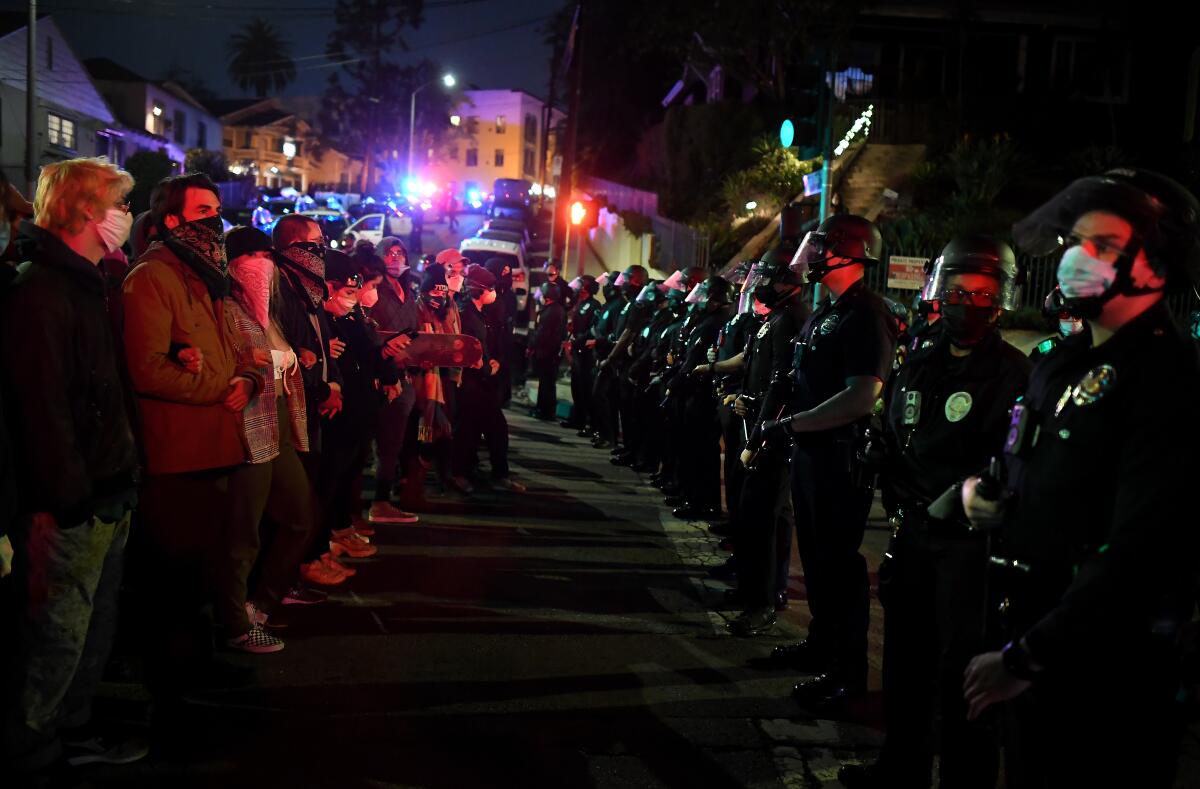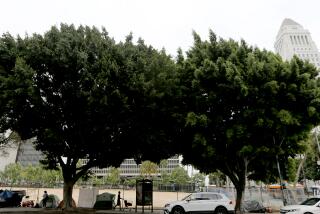Editorial: The closure of Echo Park Lake should not have been a surprise move by the city

Who’s to blame for Wednesday night’s clash at Echo Park Lake? There was never going to be an easy way to clear a public park where 100 to 200 homeless people were encamped — not when there is a dearth of housing for them and a raging pandemic that makes it unsafe for homeless people to be wandering the streets. And who knows if the city could have avoided the confrontation between 200 demonstrators and several hundred Los Angeles police officers as contractors began fencing off the park.
But one thing did not have to happen: the exasperating lack of communication to the public by Mayor Eric Garcetti and Councilman Mitch O’Farrell about why the park was closing and exactly when. O’Farrell had said months ago that the park would close at some point, but not before every homeless person was offered interim housing of some kind. He never said when, and he never said what would happen to the people who refused offers. In the weeks leading up to the required 24-hour notice of a park closure — which was posted Wednesday night — O’Farrell’s office was coyly silent on when it would happen.
Why? Because they were worried that hundreds (if not thousands) of activists would show up.
But the homeless encampment in Echo Park was a huge public controversy that embroiled residents, activists and, of course, the homeless tent dwellers themselves. Everyone deserved a specific date and explanation.
There were definitely things the city did right. The most important was that city officials called on the Los Angeles Homeless Services Authority weeks ago to start setting aside rooms for Echo Park campers in a downtown hotel leased for Project Roomkey, a program to temporarily house vulnerable homeless people.
And Echo Park Lake had to stop serving as a long-running campground. Public spaces like parks need to be shared — and closed at night.
But the mayor should have gotten out in front of this days ago and made it clear when the park was closing and why it was closing. He also should have made it clear the city was offering every homeless camper some safe interim housing.
Even LAHSA officials were frustrated by the surprise late-night announcement that the park was closing. “If you’re gonna close the park, be clear. It doesn’t mean we need to take people by surprise,” Heidi Marston, the executive director of LAHSA, told The Times on Wednesday night. “It facilitates fear, chaos and it breaks the trust we built. It seems like it didn’t need to happen this way.”
She’s right. It didn’t. This wasn’t a tactical strike. The good news is that a lot of people have been housed in the run-up to the closure. According to Garcetti, a little over 200 people who have camped out in the park since January have gone into interim housing. By midday Thursday, LAHSA said, only 10 people were left.
Having posted the requisite notice Wednesday, the city is set to completely close and clear the park by late Thursday night. But if Marston needs more time to get the remaining campers into interim housing, she will “absolutely” get it, Garcetti said in an interview Thursday.
The mayor defended the decision not to reveal the exact time of the closure, arguing that the number of protesters could have been much larger than it was if the date and time had been broadcast and noting there were no instances of excessive police force and only one arrest.
That’s good. And it’s troubling that an attempt to temporarily house homeless people became seen by some activists as an assault on vulnerable Angelenos.
But one way that could be avoided is for the city to make its actions, policies and ultimate objectives on homelessness loud and clear. If its primary goal is to get people into decent housing, not to shove them into shelters (that they don’t want or won’t stay in long) so it can start enforcing anti-camping laws against homeless people, then the mayor needs to say that. In this case, people also needed to understand why this particular encampment in this particular park was targeted at this particular time, and what the city’s actions here mean for other parks and other encampments.
Echo Park was a microcosm of viewpoints in this city — some residents weary of encampments, others trying to help homeless campers, activists sure that Los Angeles doesn’t have the best interests of homeless people at heart. Garcetti may like to act quietly behind the scenes, but on homelessness he needs to broadcast what he’s trying to do for the city.
More to Read
A cure for the common opinion
Get thought-provoking perspectives with our weekly newsletter.
You may occasionally receive promotional content from the Los Angeles Times.










